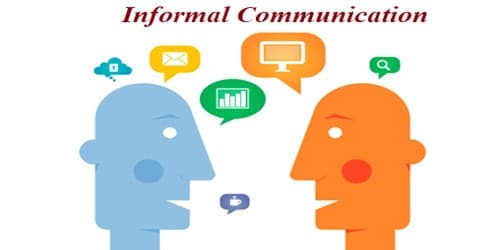Advantages of Informal Communication
The informal channel of communication has the following advantages:
- Free Environment
Informal communication is done in a free environment. The free environment means that there is no pressure on any office-big or small. This communication is more flexible than formal communication because it is free from all types of formalities. The reactions of the employees can easily be collected.
- Improving the labor-management relationship
Informal communication also plays a vital role in developing a labor-management relationship in the organization. In some cases, the flow of information through formal channels creates distrust, controversy, and disputes between management and workers. Co-operation and co-ordination can be established through a harmonious relationship between management and labor. In such situations, management can employ informal communication channels to know the attitudes, opinions, and wishes of their subordinates. This will reduce misunderstanding between workers and management and will improve their relationships.
- Obtaining immediate feedback
It is not always possible to obtain employees’ reactions or feedback on any decision of management through formal communication media. Moreover, getting employees’ feedback through formal channels takes a long time. In such a case, informal communication can be valuable in measuring the reaction of employees before any information is conveyed through formal channels. In such a situation, informal communication channels are more useful and effective.
- Interpretation:
Message sent to subordinates requires explanation or interpretation and informal communication is the valuable means here. It is easy for the employees to take the explanation by informal system. So this system plays a vital role to complete the work properly.
- Relieving Frustration
Different issues of the organization may create frustration in the mind of employees. Through expressing it to others, employees can relieve their frustrated. For different reasons, some employees may become emotional which can’t be removed through formal communication. But in a formal channel, it is not always possible. This communication acts as a safety measure to provide emotional relief and therefore helps in concentration on the job.
- Forwarding recommendation
Due to fear or chance of losing a job, employees do not like to forward their suggestions and recommendations through the formal channel. In this system, the employees inform their superior about their demands, problem and the way to develop the implementation system of the work. In such a situation, employees can use informal channels to forward their recommendations to their superiors. As a result, it creates an opportunity to send a recommendation to their management.
- Increasing efficiency
Informal communication facilitates establishing a cordial relationship between management and worker. Under the informal system, the employees discuss their problems openly and they can solve it. This cordial relationship encourages the employees to be sincere in discharging their duties and thus increase their efficiency. For this, the work is done properly and it develops the efficiency of the employee.
- Helping decision making
Through informal communication, management gets the opportunity to collect information from different corners that help them to take the right decision and solve any problem efficiently and effectively. Therefore management can take necessary action timely and effectively.
- Present grievance:
Under the informal system, the employees disclose their needs, sentiment and their emotions to others’ authority without feeling any hesitation. This communication system gives the employees a better opportunity to raise their complaints, grievances or claim.
- Job Satisfaction:
One of the best advantages of informal communication is that it helps also to increase the level of job satisfaction in the mind of workers indirectly. But it really works.
From the above discussion, we can conclude that informal communication is essential for bridging the communication gap in every spare of organizational activities. That is why; businesses in modern times give more emphasis on the practice of informal communication.















